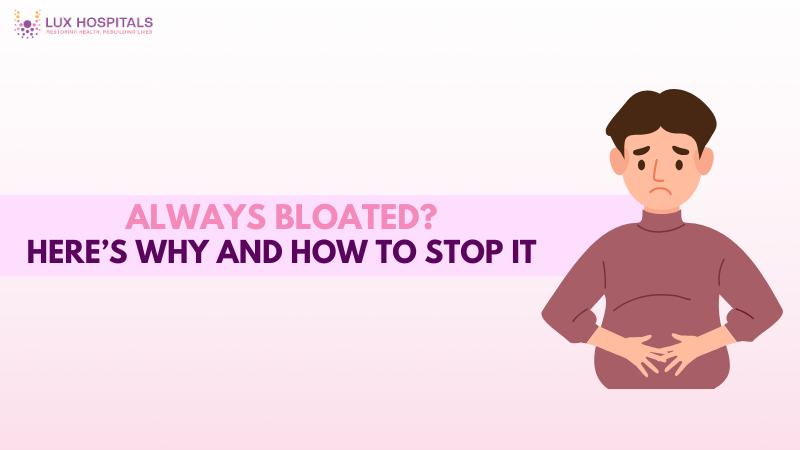Always Bloated? 10 Reasons Why and How to Fix a Bloated Stomach

If you’re constantly dealing with a bloated stomach, you’re not alone. Bloating affects millions and often disrupts daily comfort and confidence. Whether after meals or seemingly random, a bloated stomach can signal underlying issues. Stopping it requires knowing why it occurs for good. In this detailed blog, we’ll explore the most common reasons behind persistent bloating, actionable ways to get relief, and how to prevent it long-term.
Reasons Behind a Constantly Bloated Stomach
A bloated stomach can be caused by a wide range of lifestyle, dietary, and medical factors. From poor eating habits and food intolerances to stress and hormonal changes, understanding the root cause is the first step toward lasting relief. Below are the 10 most common reasons why bloating occurs and what you can do to prevent it.
1. Poor Eating Habits and Swallowing Air
Eating too fast, chewing gum, talking, or eating can make you breathe out, which can cause a bloated stomach. Carbonated drinks also increase air in the digestive tract. This kind of bloating can be greatly reduced by eating less and staying away from carbonated drinks.
2. Food Intolerances and Sensitivities
Lactose, gluten, and fructose intolerances can lead to a bloated stomach. When your body can’t properly digest these compounds, gas builds up in your intestines. Identifying and eliminating trigger foods is essential for long-term relief.
3.Constipation and Irregular Bowel Movements
A bloated stomach is frequently the result of infrequent bowel movements. Stool ferments and releases too much gas while it is still in the colon. Bloating can be decreased and digestion stimulated by increasing fiber intake, drinking plenty of water, and exercising.
4. Overeating and Portion Sizes
Large meals can stretch your stomach and slow digestion, resulting in a bloated stomach. This is especially true with high-fat or processed foods. Smaller, more frequent meals can support the maintenance of digestive efficiency and reduce bloating.
5. Gut Microbiome Imbalance
An unhealthy balance of gut bacteria can cause a bloated stomach by increasing fermentation and gas production. Stress, bad diets, and antibiotics can upset this equilibrium. Symptoms can be reduced and gut health restored with probiotics and fermented foods like kimchi and yogurt.
6. Hormonal Changes in Women
Many women experience a bloated stomach during their menstrual cycle due to hormonal shifts that affect digestion and water retention. Estrogen and progesterone levels can influence gut motility. Menstrual bloating can be lessened by consuming more fluids and less sodium.
7. Irritable Bowel Syndrome (IBS)
Cramps, stomach bloating, and irregular bowel movements are common symptoms of IBS, a chronic disorder. Hormonal changes, stress, and certain meals all cause it. A low-FODMAPS diet and stress-reduction techniques can help manage IBS and reduce bloating.
8. Lack of Physical Activity
A sedentary lifestyle contributes to stomach bloating by slowing down digestion. Food and gas are moved through the intestines by gut contractions, which are stimulated by movement. Bloating symptoms can be significantly reduced by taking even a 20-minute stroll after meals.
9. Stress and Anxiety
Chronic stress can impact your gut-brain connection, resulting in a bloated stomach and other digestive issues. Stress increases cortisol levels, reducing enzyme secretion and slowing digestion. Practicing mindfulness, yoga, and breathing exercises can ease stress-induced bloating.
10. Carbonated and Sugary Drinks
Gas is released into your digestive tract by beverages like soda and sparkling water, which can lead to a bloated stomach. In sensitive people, artificial sweeteners can also cause bloating. To stay hydrated, choose herbal teas or water without the extra gas.
How to Prevent and Relieve a Bloated Stomach?
- Eat Slowly: Avoid talking while eating and chew your food well.
- Determine Triggers: Record your food intake in a journal. bloating patterns.
- Increase Fiber Gradually: Helps with regular bowel movements without causing gas.
- Stay Hydrated: Water supports digestion and reduces bloating.
- Exercise Regularly: Promotes gut movement and reduces water retention.
- Avoid Artificial Sweeteners: Many cause gas and bloating.
- Try Herbal Remedies: Peppermint and ginger teas soothe digestion.
- Use Probiotics: Support a healthy gut flora to prevent a bloated stomach.
Conclusion
Living with a bloated stomach doesn’t have to be your normal. By recognizing your triggers and forming healthy habits, you can lessen bloating and improve your everyday comfort level. Whether you’re managing stress, adding exercise, or altering your nutrition, small adjustments have a significant impact. If you make lifestyle adjustments but your bloated stomach still occurs, don’t be afraid to see a doctor to rule out any serious
Frequently Asked Questions
A consistently bloated stomach that feels hard could result from gas buildup, constipation, or fluid retention. It might also be linked to underlying medical conditions such as IBS or ascites. If it's persistent or painful, a medical evaluation is necessary.
Women often experience a bloated stomach due to hormonal fluctuations during menstruation, pregnancy, or menopause. Food intolerances and IBS are also common causes. Managing diet, hydration, and stress can significantly reduce bloating.
To relieve a bloated stomach, avoid trigger foods, eat slowly, drink plenty of water, and exercise regularly. Including probiotics and digestive enzymes can also help. A healthcare provider should evaluate chronic symptoms.
Be concerned about a bloated stomach if it's persistent, painful, or accompanied by symptoms like vomiting, unexplained weight loss, or blood in stools. These could indicate serious medical issues, and immediate medical attention is advised in such cases.
Water consumption promotes easy digestion and helps eliminate extra sodium, which lessens stomach bloating. It guarantees that nutrients are absorbed correctly. and avoids constipation. Steer clear of carbonated.




















